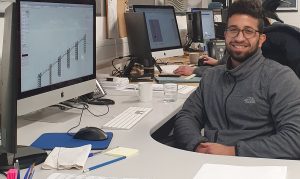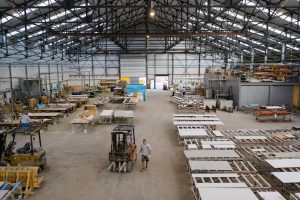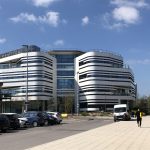 Produced by Guest blogger
Produced by Guest blogger
This is a guest blog by Mousa Askar, who’s studying the MSc Engineering Project Management.
My Name is Mousa Askar, and I am an international student taking a master’s degree in Engineering Project Management at BU. I moved to Bournemouth in 2015 and now I am undertaking a yearlong placement at MASS Concrete, a leading UK manufacturer of bespoke concrete, as a CAD designer.

The company works closely with architects, specifiers and designers to enable their vision to come to life. Their work is often found in high end commercial environments such as, receptions, bars, hotels, retail spaces and restaurant chains.
Before starting my master’s degree in project management, I graduated with a mechanical engineering degree and I was lucky enough to find a role that allows me to put an extensive amount of theory from both courses into practice. I work in the production department at MASS and provide 3D and 2D design drawings based oinclude the design of steel supporting structures, based on different loading and fixing conditions, considering wind and crowd loading as well as the movement of structural elements. Concrete is a heavy material, and it requires special care when transported and installed, therefore logistics is something I need to consider and incorporate early in the design process.
Construction projects often include several stakeholders therefore communication is a key skill that I am continuously working to improve. In many cases, while I am producing a set of drawings, I need to contact several people in order to ensure coordination before passing my work for client approval. For instance, contacting an external stakeholder such as a project manager or project structural engineer to obtain instructions on fixing a concrete panel on a particular structural element within a building. In other cases, the communication can be internal for example verifying the feasibility to produce a certain complex architectural feature with the production manager.

I have found my industrial placement to be a valuable experience and I highly recommend international students to take advantage of this opportunity as part of their degree course. A placement can allow students to apply what they have been learning over the years and open their eyes to new and interesting opportunities. A deeper understanding of the industry related to your course is one advantage, but in my view the most important outcome is that a placement can pave the way for an engineering graduate to attain chartered status as well as becoming more determined about their future career progression.
 How John’s dedication helped him start his career at JPMorgan
How John’s dedication helped him start his career at JPMorgan #MyPlacementStory – RACS Marketing & RACS Group
#MyPlacementStory – RACS Marketing & RACS Group From Rome to Bournemouth – how BU helped build my career with Siemens
From Rome to Bournemouth – how BU helped build my career with Siemens Why would you study for a Master’s degree ?
Why would you study for a Master’s degree ?








